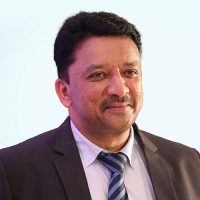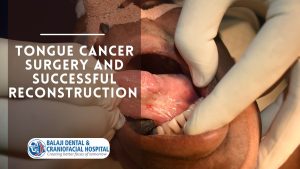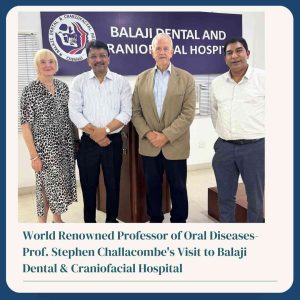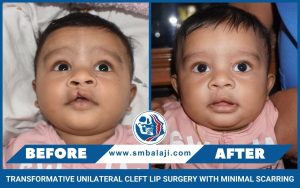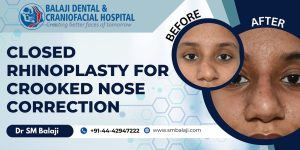Discovery of osseointegration of titanium with living bone
Dr Per Ingvar Branemark, a Swedish medical researcher, had placed titanium implants in the bones of rabbits for an experiment; however, when he tried to remove the titanium implant from the bone, he found that it had become as one with complete fusion of the bone with the implant. There was no distinguishable border between the two and he realized that he had stumbled onto something that could truly revolutionize surgeries related to bone. He later developed dental implants after extensive research and established Nobel Biocare as a manufacturer of dental implants. Constant research has helped in diversifying the type of implants available today, each one of which has specific uses. The two implants used in the case described below are the zygoma implants and conventional implants.
Patient suffering from chronic gum disease and teeth problems
The patient is a 58-year-old native of Hyderabad in Telangana. He has suffered from dental problems for a long time as he had not taken proper care of his oral hygiene and oral health. He has also had swollen and bleeding gums along with bad breath for many years now. Of late, he noticed that most of his teeth were mobile. This had made it difficult for him to eat and he had gradually reduced his food intake. His weight had gradually reduced because of this.
Finally, he decided to seek a permanent solution for his problems. He decided to seek the advice of a dental specialist and stated that he had visited multiple dental hospitals and dental clinics elsewhere in search of a solution for his dental problems. They had recommended that he undergo total extraction followed by replacement with a removable complete denture, but he felt that it would be very inconvenient. Complete removable dentures can often become dislodged during speech and chewing if there is inadequate bony support. However artificial tooth manufacturing technology has come a long way from this dated treatment modality. One dentist he had visited had recommended dental implants as a solution for his problems. It was explained to the patient that long term benefits and the convenience factor was highest with dental implants. He then referred the patient to Balaji Dental and Craniofacial Hospital as it is renowned for dental implant surgery in Chennai. Our hospital is a specialty center for zygoma implant surgery in Chennai.
Initial presentation at our hospital for consultation
Dr SM Balaji, dental implant surgeon examined the patient. Dental implant placement is a treatment modality best performed by oral and maxillofacial surgeons. This revealed that the patient had generalized gum recession and bleeding along with bad breath. He also had a bridge in his upper jaw, which had become mobile. Most of the patient’s teeth were extremely mobile. He then ordered comprehensive imaging studies for evaluating the bone level in the patient’s jaws. This revealed severe generalized bone loss.
Comprehensive treatment planning was done and explained to the patient in detail. He was made to understand the various surgical procedures that were involved in the extraction of teeth followed by placement of the implants. The patient was advised to undergo extraction of his remaining teeth followed by replacement with implants. Zygoma implants or zygomatic implants were advised for the patient as he lacked sufficient bone for conventional implants in the maxillary posterior region. The bone substitute with rh-BMP2 would to be used for sinus lift and also to augment the posterior maxillary ridge. This treatment plan was adopted as the patient was not ready for any major bone grafting procedures. He wished to undergo the whole procedure under local anesthesia if possible. The patient agreed to this treatment plan and gave his consent.
About zygoma implants and rh-BMP2 bone replacement material
Zygoma implants are different from conventional dental implants in that they anchor into the zygomatic bone rather than the maxilla. They may be used when maxillary bone quality or quantity is inadequate for the placement of regular dental implants. A bone substitute along with rh-BMP2 was used to help stimulate progenitor cells at the site into osteoblasts for formation of new bone. Rh-BMP2 is the result of biomedical engineering research that has many applications in oral and maxillofacial surgery.
Patient undergoes total extraction followed by placement of implants
The first step of treatment was removal of the mobile bridge. This was then followed by extraction of all the mandibular teeth. An incision was then made along the center of the mandibular alveolar ridge and a flap was elevated. This was followed by placement of the mandibular implants. The flap was then sutured close after placement of the implants. Extraction of the remaining maxillary teeth was performed next. A midcrestal incision was made and flap reflected. Bilateral sinus lift surgery was next performed through the lateral window technique. The Schneiderian membrane was then separated from the bone. The next step was placement of the zygoma implants bilaterally. Following this, a bone substitute mixed with rh-BMP2 was densely packed into the gap between the Schneiderian membrane and the bone. The entire maxillary ridge was also augmented using the bone substitute mix following which conventional Nobel Biocare dental implants were placed in the upper arch.
Patient expresses his satisfaction at the results of the surgery
Postoperative course was uneventful and the patient’s wounds healed well without any complications. The patient was given a removable partial denture following implant placement. Permanent fixed dentures will be placed in the patient’s mouth once complete osseointegration of the implant with the bone has been achieved in 3-4 months.

